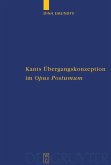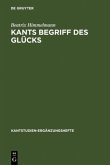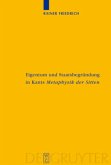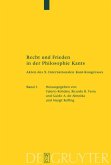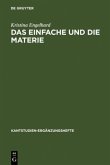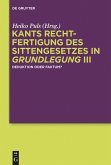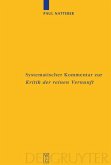Kant writes at one point in the Critique of Pure Reason that practical freedom can be recognized "through experience, as one of the natural causes" (B 831). This claim appears to conflict with a central epistemological theme of his critical philosophy. This work responds by carefully tracing the details of the relationship between transcendental and practical freedom through all of Kant's writings (published works, lecture notes, etc.). It turns out that Kant uses the term 'practical freedom?' in several quite different senses and draws on pre-critical theses to varying degrees.
Kant schreibt an einer Stelle der "Kritik der reinen Vernunft", praktische Freiheit sei "durch Erfahrung, als eine von den Natursachen" erkennbar (B 831). Das scheint im Widerspruch zu allen ,kritischen' Thesen Kants zu stehen. Um die darin steckende Spannung genauer zu erkennen, werden alle Schriften Kants (Werke, Vorlesungsmitschriften etc.) auf das Verhältnis von transzendentaler und praktischer Freiheit hin untersucht. Es zeigt sich, dass Kant den Begriff "praktische Freiheit" auf dreifache Weise verwendet und Teile der ersten Kritik auf vorkritischen Thesen beruhen. Obwohl die besagte Stelle in ihrer Widersprüchlichkeit seit langem bekannt ist, gab es bisher keine gründliche Untersuchung ihrer Bedeutung.
Kant schreibt an einer Stelle der "Kritik der reinen Vernunft", praktische Freiheit sei "durch Erfahrung, als eine von den Natursachen" erkennbar (B 831). Das scheint im Widerspruch zu allen ,kritischen' Thesen Kants zu stehen. Um die darin steckende Spannung genauer zu erkennen, werden alle Schriften Kants (Werke, Vorlesungsmitschriften etc.) auf das Verhältnis von transzendentaler und praktischer Freiheit hin untersucht. Es zeigt sich, dass Kant den Begriff "praktische Freiheit" auf dreifache Weise verwendet und Teile der ersten Kritik auf vorkritischen Thesen beruhen. Obwohl die besagte Stelle in ihrer Widersprüchlichkeit seit langem bekannt ist, gab es bisher keine gründliche Untersuchung ihrer Bedeutung.


